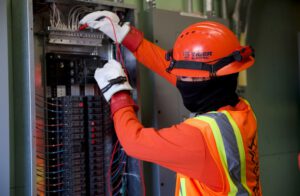A commercial Electrician works in commercial establishments, where their work is critical. Not only do they ensure that the electrical system functions properly, but they also provide quality service that keeps a business running smoothly. Many commercial enterprises depend on their electrical systems to run at optimal performance, and they require a quick response time. A commercial electrician can ensure that their office runs properly with up-to-date electrical systems and services. A good commercial electrician will have extensive experience in all electrical service areas, including installation and repair.

Typically, a commercial electrician works indoors, although they may also work in smaller areas. In addition, they often spend a significant amount of time in a truck, and they move around a great deal. A commercial electrician’s job is physically demanding and dangerous, but proper safety gear and adherence to safety regulations can reduce the risk. However, if you don’t want to endanger your life or the lives of others, becoming a commercial electrician is a great choice for you.
A commercial electrician’s job involves installing power outlets and lighting, and they usually use a three-phase approach for wiring. The two smaller legs of the wire carry a particular voltage, while the larger leg has a higher voltage. The wiring in a commercial setting maybe 120 volts, 208-240 volts, or 277/480 volts. The exposed ends of the wires are protected by conduit, but they may also run along walls.
Another type of commercial electrician is an industrial one. They perform similar tasks as residential electrical contractors, specializing in industrial settings. They install wiring systems and machines and install control panels. They will also handle all aspects of electrical permits, which are commonly required in major cities. In addition, they have the skills and training to install high-voltage equipment. You can hire an industrial electrician if your electrical system is outdated or not in code. They will also upgrade your current panel or install a new one.
A commercial electrician must be licensed to work in a business. This can be done by enrolling in an apprenticeship program or earning an associate’s degree. Those aspiring to become commercial electricians should have a high school diploma. They should be familiar with circuit calculations because their work involves complex calculations. Moreover, an industrial electrician must have a strong understanding of mechanical and electrical systems. Therefore, they should take courses in these fields.
A commercial electrician can perform both industrial and residential electrical work. The training of an industrial electrician is different from that of a commercial electrician. Moreover, this professional will be employed in industrial settings and involved in major projects. Therefore, they should be familiar with different types of electrical systems and maintain them safely. It is important to note that these electricians will perform the electrical work in both types of environments. The main difference between a residential and an industrial electrician is that they have different job functions.
A commercial electrician will install power outlets and lighting in a business or other place. They will also install and maintain photovoltaic systems. The wiring of a commercial establishment usually follows a three-phase approach, with two small legs running a single voltage and a large leg running a higher voltage. Depending on the nature of the project, the electrician will need to work in cramped areas. The commercial electrician will also be required to lift heavy loads.
An industrial electrician installs, repairs, and maintains electrical equipment in a manufacturing environment. They must have extensive knowledge of safety, as many industrial plants have sensitive data. An industrial electrician will also be responsible for the maintenance of electrical equipment. A commercial electrician will need to have years of experience before starting their career in this field. Once they’ve established themselves, they can choose to work as an industrial electrical inspector. They may work for other businesses or even on their own.
A commercial electrician will install power outlets and lighting in a building. Their wiring is usually three-phase with two smaller legs running one voltage and a larger leg running a higher voltage. These electrical requirements are often more demanding than those of a residential building. A commercial electrician will need to understand and implement these differences to provide the best service possible. They can also install lighting in commercial buildings, and they should have experience with various building types.